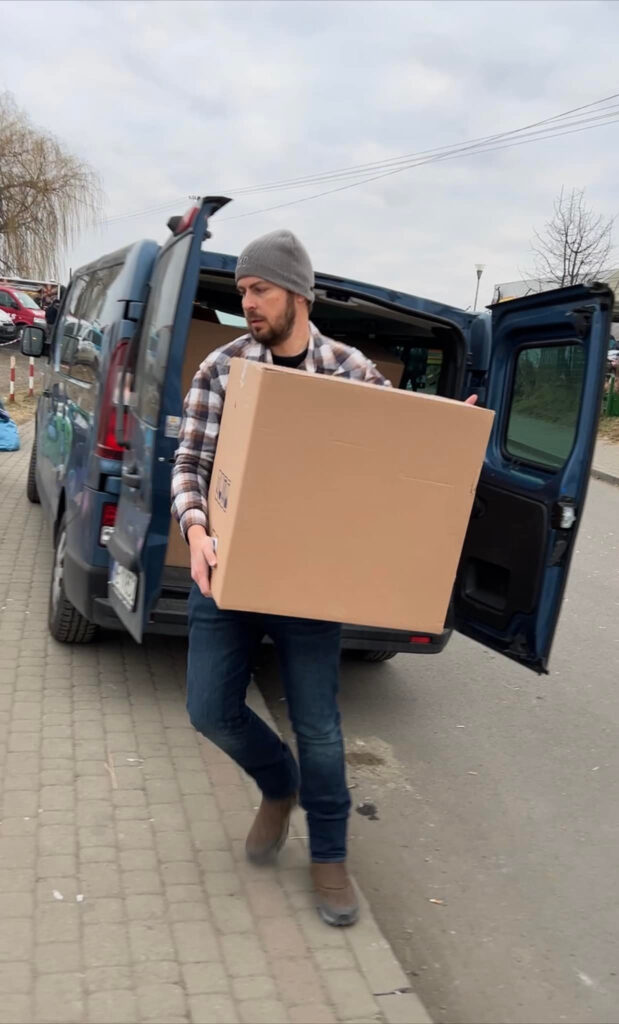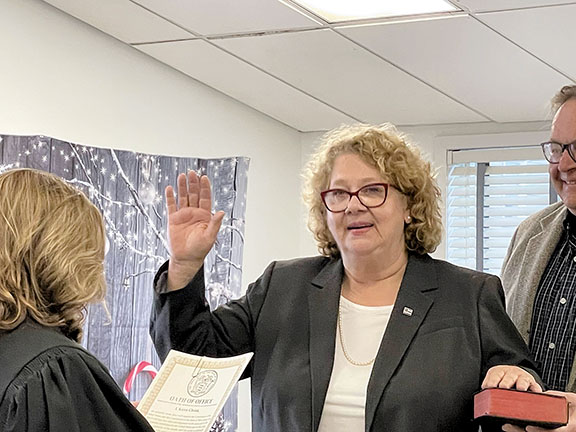
By Chris Rotolo
HIGHLANDS – A Ukrainian man with bloodshot eyes and a bandage fixed to his head has his cell phone camera angled upward, documenting the still of the moment inside a residential dwelling. The fear projected in his facial features foreshadows the storm to follow this moment of tranquility.
The drops of rain beating against the skylight above are drowned out in an instant by the shriek of a military-grade, jet propelled engine.
It’s not like the movies. There is no preceding hiss or whistle to warn of an approaching explosive in freefall. Just an audible burst of air and a nearly immediate detonation. The sounds of shattering glass, crumbling brick and a chorus of human suffering follow.
The screen goes dark, and the next clip begins to load. A devastated Ukrainian mother is crumpled on the rubble beneath her boots, too shocked to shed a tear, as paramedics work to resuscitate her toddler.
There has been no shortage of sights and sounds similar to these over the last two weeks since the Russian invasion of Ukraine began.
“No war has ever been fought like this,” Karen Chelak told The Two River Times in a March 5 interview. “No war has ever been seen like this; broadcast for everyone to watch it unfold in real time.”
In addition to her role as a council member in the Bayshore borough of Highlands, Chelak sits on the executive board of the Ukrainian National Women’s League of America, an organization founded in 1925 to inform the free world about events occurring in Ukraine.
In 1932 through 1933, the Russian administration of Joseph Stalin launched the Holodomor in Ukraine, which translates to “man-made famine.” Approximately 3.5 million Ukrainians perished in this mass starvation event.
“Russian aggression against Ukraine is not a new concept,” Chelak explained.
Chelak’s ties to Ukraine stem from her husband, Russ, whose parents are native to the country, but emigrated to the United States to escape the turmoil.
“He was able to go back with his parents in 1964. It was the Soviet Union then,” Chelak recalled. “His parents wanted to visit the graves of his grandparents. The trip was completely derailed by the KGB. They were forcibly routed to Moscow where they had to visit the tomb of Lenin. Finally, they made it to Ukraine and Russian police stopped them from entering the burial site. Their cameras were confiscated before they departed back to America.” He has not visited again.
With such negative memories of imperialist Russia fueling them, and a constant flow of new content depicting the civilian casualties of this campaign – about 400 civilians killed and about 800 injured as of March 7 – Chelak said the Ukrainian-American communities in New Jersey and across the country have mobilized to support those in the fight, as well as those caught in the crossfire.
“It’s been heartbreaking to watch this play out. And every new day seems to bring new heartbreak. For so many Ukrainian-Americans it’s felt like a death in the family. There’s immense sadness, but an urge to do something, anything, to support your loved ones.”
Chelak noted the many prayer vigils taking place around the state, as well support groups for grieving Ukrainian-Americans that have developed both in person and virtually.
Supply drives and fundraisers have been launched to help support those fighting in Ukraine, and refugees fleeing the country. The largest of these humanitarian aid drives is ongoing at the Ukrainian American Cultural Center of New Jersey (UACCNJ), located in Whippany.
At this point, the UACCNJ has placed a high priority on the donation of medical supplies and communication technology, like walkie-talkies, to assist hospitals and emergency medical units that have reported performing lifesaving operations in facilities with no electricity, running water or heat.
“The outpouring of support from non-Ukrainians and Ukrainian-Americans alike has been so encouraging. It seems like everyone has been volunteering in some form or another. In New Jersey, Philadelphia, Chicago, Boston, Pittsburgh, Cleveland; these communities of Ukrainians are large and located all over the country. But I think social media was an aspect of this war Putin hadn’t considered. These images and videos have allowed the world to realize that this isn’t a Ukrainian crisis, it’s a humanitarian crisis. This war has effected everyone, and we’re all coming together in this time of great need.”
Chelak stressed that the next month will be critical in the Ukrainian fight to repel Russian advances. Economic sanctions and the ability of Ukrainian defenses to withstand the onslaught could place an overwhelming squeeze on the Kremlin, and force the withdrawal of troops and artillery.
Those looking to support the effort can learn more about supply drives and fundraisers by visiting uaccnj.org or unwla.org.
Chelak and her husband aren’t the only Jersey Shore residents worried about Ukrainian citizens and wanting to do anything to help those displaced by the war.
Point Pleasant Beach Mayor Paul M. Kanitra is headed back home from Poland where he spent the last week helping out with the influx of refugees, Ukrainians fleeing their homes because of the Russian invasion. Kanitra and a friend, loaded with donated clothing and funds, arrived in Poland, rented a van and helped out wherever they were needed.
On Facebook and in televised interviews, the mayor explained that he is of Polish and Slovakian descent. “And I feel compelled to do something watching this insane horror unfold,” he said. “I don’t know how much of a difference one person can make, but I’m at least going to try.
“Young Ukrainians have been coming to Point Pleasant Beach to enjoy a summer operating our rides, attractions and more for many years,” he wrote on Facebook. “They’ve forged a special bond with so many of our residents. It’s nice to see the community coming together like this to give back in their time of need.”
Kanitra has been updating his Facebook followers with photos and videos of his time in Poland as he helped prep meals for World Central Kitchen, delivered supplies to the border crossing and ferried arriving families to the refugee center. He has met Ukrainians arriving by rail, fighters and families staging to go back to Ukraine, and had an emotional encounter with orphans from across Ukraine heading to a Polish orphanage.
“Hopefully shedding some light on it all here will do some good by raising awareness,” he wrote.
“Shipping things here is mostly impractical,” Kanitra wrote. “It’s expensive and they have a lot of warehouses already filled with clothes, water, food, etc. They need more help and better logistics. That can really only come through donations.”
The Polish Red Cross is providing vital medical assistance to those who need it. Donations can be made through the International Committee of the Red Cross at icrc.org.
World Central Kitchen is providing hot, high quality meals at all border crossings and refugee centers in Poland and other border countries. Visit wck.org to donate.
The article originally appeared in the March 10 – 16, 2022 print edition of The Two River Times.















